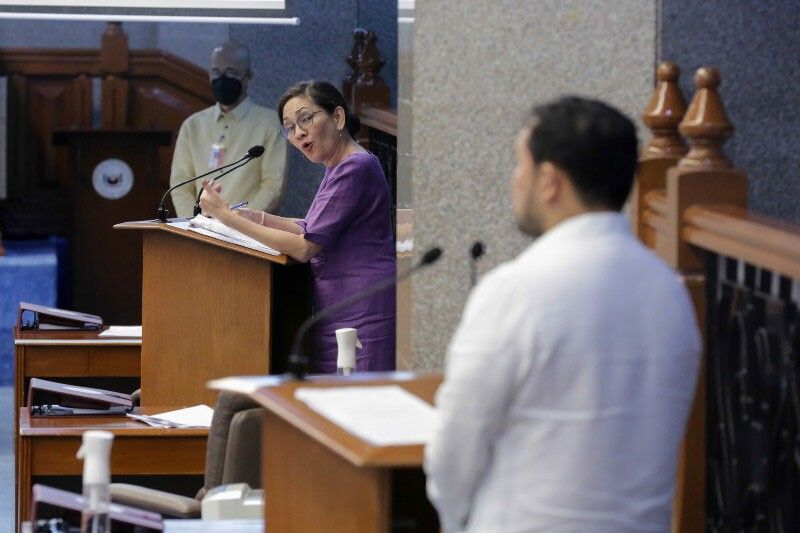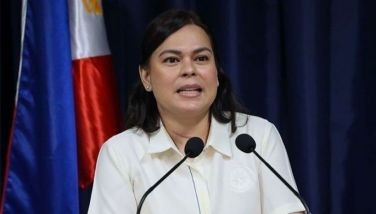Senate debates on Maharlika fund bill continue

MANILA, Philippines — As Congress begins on Friday its two-week break, debates over the Maharlika Investment Fund (MIF) bill in the Senate continue, with Minority Leader Aquilino Pimentel III questioning the apparent rush by his colleagues in the majority to have the measure passed.
During plenary session on Monday, Pimentel subjected Sen. Mark Villar – sponsor of Senate Bill 2020 – to hours of interpellation, particularly on the measure’s being certified as urgent by President Marcos.
Pimentel cited Paragraph 2, Section 26, Article XVI of the Constitution, which only allows a measure to be certified as urgent “to meet a public calamity or emergency.”
“What is the public calamity or emergency which will be met by the immediate enactment of this measure?” Pimentel asked.
In response, Villar said it’s the executive that determines if a situation is urgent, as it has access to information that can justify its action.
Yesterday, in his turno en contra (speak against) speech at the plenary, Pimentel raised suspicion that Malacañang wants to create the MIF as a “favor” to a certain “businessman.”
He also said the “origin of the MIF remains a mystery” as it was not mentioned during the campaign of President or in his previous national address.
“The most logical question to ask is: where did this idea come from? Is it possible that we are doing this as a favor to a businessman who has access to the ears of the powers that be, whose business or bottomline has been hit by the downturn in the world economy and thus would need a new client?” Pimentel said without elaborating.
“We will hopefully know the identity of this big-time influencer in due time,” he added.
Pimentel, on Monday, also questioned Villar about the nature of the MIF. “Let us be truthful in our messaging. All I’m saying is, let’s cut and stop the claim that it is a sovereign wealth fund because it is not,” Pimentel said.
“I respect your opinion. All of these funds that are defined as sovereign wealth funds have differences. They’re all different. They all have certain needs and they serve different purposes, whether it be in Indonesia or Vietnam or India, or in Norway, there’s no way you look at all of them,” Villar said in response.
“None of them are exactly the same. So if we’re going to see that this is not exactly the same, it’s not exactly the same, but it serves similar purposes. They have similarities, they serve similar purposes,” he explained.
“But of course, it has to be tailor fit to the country that it’s being applied to, and that’s no different. The market is no different from any other in the sense that it is tailor fit for the country that it is being applied to,” he added.
“There is no denying that the original proposal which came from the House, and it was sovereign wealth fund. If we trace it all the way to the current Senate version, it has undergone a lot of changes,” Pimentel maintained.
At past midnight, Pimentel moved to suspend the interpellation and resume today.
Villar, however, objected, claiming that senators have been debating on the issue for three weeks already.
“Mr. President, I object. I think we’ve debated this extensively. I’ve answered all the interpellations without prejudice to the amendments being proposed. I’d like to object and I’d like to move to close interpellations,” Villar pointed out.
Pimentel replied that “since that’s a motion, so we are entitled to probably comment or discuss. Sayang (too bad), we are getting into the meat of the proposed measure, especially on the investment in section 14, Mr. President. There are so many concepts that we need to clarify.”
Senate President Juan Miguel Zubiri adjourned the session at 1 am.
Interpellation over?
Senate Minority Leader Joel Villanueva said on Monday it was the right of the sponsor to move to close the period of interpellation: “The second part of the issue, if I hear it right, it is the pleasure of the sponsor to no longer entertain questions.”
Zubiri agreed with Villanueva.
“It’s a prerogative of the sponsor to close a period of interpellation. And we appeal to our Minority Floor Leader, that tomorrow (Tuesday) we reserved for the turno en contra (speak against),” Zubiri said.
“And we will give you time to give you a turno en contra and then after which we do the period of amendments, which will also require us to wait a bit because after we do the period of amendments, we will ask for a clean copy which will be given to the members for final approval of the second and third reading tomorrow,” he added.
Villar reiterated that he has already “exhausted all the questions.”
“I feel like I’ve answered the issues. And again, we do have a period of amendments where we can – I think that is – we can consider all these suggestions at the period of amendments. And I’d like to move to close the period of interpellation.”
Earlier, Sen. Risa Hontiveros questioned why a provision that may justify the use of pension funds from both the Government Service Insurance System (GSIS) and Social Security System (SSS) still exists in the Senate version of the MIF bill.
“We know that the use of SSS and GSIS funds is removed from the House version. But, this looks like we are opening a backdoor. Can you assure the body and the public that SSS and GSIS members will not lose their hard-earned pension money, in the same manner, that even some of the best-managed sovereign funds lost hundreds of billions recently?” the deputy minority leader said in a mix of English and Filipino.
Hontiveros also appealed to her colleagues, especially the members of the majority, to study the provision in question and help remove it from the final form of the measure.
Senators have insisted they prefer not to be rushed into making a decision on the MIF bill.
“Haste… as the saying goes, makes waste. This should serve as a warning to those pushing for it because it might just be struck down and end up in the dumpsters if they proceed with it in a haphazard and nonchalant manner,” Sen. Francis Escudero pointed out.
“The purpose and main reason and therefore direction and thrust of the Fund is still vague and nebulous,” Escudero said. “It is not clear even for those pushing for the bill, much less in the bill itself.” But Villanueva made clear that there is no pressure on the Senate from the Palace to pass the MIF bill.
“Nothing,” Villanueva said when asked by The STAR on Monday whether there was such pressure to pass the MIF bill before Congress goes on break on June 2. “It’s just one of the priority measures,” he said.
GSIS, SSS can opt in
At Malacañang, Finance Secretary Benjamin Diokno dismissed Pimentel’s claim that the failure of the fund may lead to the collapse of state-owned banks.
Speaking to reporters, Diokno said Land Bank of the of the Philippines would only invest three percent of its more than P1-trillion investible funds in the Maharlika Corporation.
“It (Landbank) will only contribute about P50 billion and it will probably get higher returns compared to their current fund,” the finance chief said.
The Development Bank of the Philippines, another state-run bank, is also being eyed as source of capital for MIF.
Diokno said Pimentel’s pronouncement might create panic among the public, particularly depositors of the state-run banks. “It may only create panic. There’s no basis for that,” Diokno said.
He also said board members of the SSS and the GSIS should not be prevented from investing in the proposed sovereign wealth fund just because they are presidential appointees.
“We don’t want to preclude the board. That’s a board decision,” he said.
“It’s a decision of the board. While they are presidential appointees, they act in the best interest of the company,” Diokno added.
Meanwhile, the militant Bagong Alyansang Makabayan (Bayan) will hold a protest action today against what it described as the railroading of the MIF bill.
Bayan said protesters are set to rally outside the Bangko Sentral ng Pilipinas complex on East Avenue in Quezon City at around 10 a.m.
Demonstrators will show a banner denouncing the MIF as “being prone to corruption” and for using the public’s money as its source of funds.
Instead of prioritizing the MIF bill, Bayan has urged senators to focus on people’s concerns such as wage increase, agriculture subsidy and labor security. The group called the MIF an ill-conceived and corruption-prone scam. – Helen Flores, Emmanuel Tupas, Marc Jayson Cayabyab
- Latest
- Trending



























